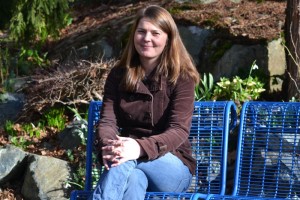Know Your Profs is an ongoing series of profiles on the instructors at Camosun College. Every issue we ask a different instructor at Camosun the same 10 questions in an attempt to get to know them a little better.
Do you have an instructor that you want to see interviewed in the paper? Maybe you want to know more about one of your teachers, but you’re too busy, or shy, to ask? Email editor@nexusnewspaper.com and we’ll add your instructor to our list of teachers to talk to.
This issue we talked to Camosun writing professor Jasmine North about becoming other, pronouncing vowels, and our collective existence.
1. What do you teach and how long have you been at Camosun?
I’ve been teaching at Camosun since the summer of 2010. I teach composition, literature, and technical writing classes.

2. What do you personally get out of teaching?
I enjoy witnessing and participating in the process of “becoming other,” which is a concept developed by Gilles Deleuze and Félix Guattari in A Thousand Plateaus: Capitalism and Schizophrenia. Basically, if the concept is related to the classroom, each new class is composed of a multiplicity of different people whose way of seeing the world is a result of different family, cultural, and educational backgrounds. The classroom becomes an assemblage of people from all different walks of life, and as a result of the convergence of these different worldviews each person in the class, including myself, learns something new and begins to see the world in a slightly different way.
3. What’s one thing you wish your students knew about you?
I wish they knew how hard I have worked to get to where I am and how hard I continue to work to try to give them the tools they need to succeed as well.
4. What’s one thing you wish they didn’t know about you?
I wish that I could pronounce every word properly. I have trouble with vowel sounds and order; I was made fun of in high school (and beyond) because of the way I pronounced “ambulance.” I think I have it right now, but I can’t actually tell because I can’t seem to hear the difference.
5. What’s the best thing that has ever happened to you as a teacher here?
I feel like I have become a part of an amazing community that is united by its desire to provide the knowledge and skills required to better our collective existence.
6. What’s the worst thing that’s ever happened to you as a teacher here?
I recently worked extremely hard to design a new online course. Teaching online is a completely different process, and despite the fact that I spent a huge amount of time trying to create a course that I thought was accessible and interesting, I wasn’t able to create the same kind of connection or rapport that I have been able to create in a face-to-face setting with students. I have learned, over the last six years, that despite my best intentions it’s actually not possible to give every single student exactly what they want in terms of the type of information they are seeking or the method of delivery by which they receive that information.
7. What do you see in the future of postsecondary education?
My biggest concern is the cost of education. It can be difficult to promote learning when you know, based on your own experience, that education is expensive. Student loans are great because they provide access to education, but they do build up rather quickly, and paying them back, with interest, is a significant burden.
8. What do you do to relax on the weekends?
In the winter, I like to read by the fireplace. In the summer, when I have more time, I like to garden and paint.
9. What is your favourite meal?
That’s a hard question because I have more than one answer! If I’m cooking, Maui beef strips from the Red Barn Market with perogies fried in olive oil and green beans sautéed in butter and garlic. If my partner is cooking, I think my favourite dish is seafood pasta (angel hair pasta with crab, scallops, and shrimp). But he is a fantastic cook, so I like pretty much everything he makes.
10. What’s your biggest pet peeve?
When there is an accident on the highway and none of the people on the road have enough sense to clear a pathway for the emergency vehicles.
